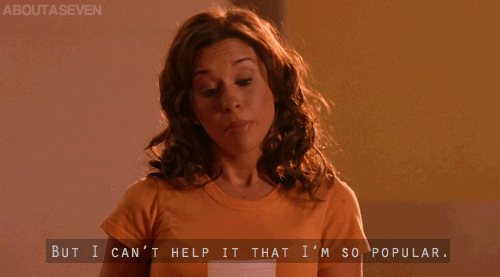Life
This Surprising Trait May Make You Popular

Everyone knows what "popular kids" are like
— charismatic yet secretly cold, outwardly nice but inwardly filing away your every comment to make fun of later, and, of course, always jockeying for the coveted position of Queen Bee (or whatever the male equivalent is)... or are they? According to a recent study, that perception could be entirely wrong, because popular children are actually more empathetic toward their peers. I'm sorry to say that Mean Girls may not be as accurate as you previously believed, and your entire adolescence is a lie. On the flip side, at least there's finally a study showing people are nicer than we think for once. As someone with a psychology degree, let me tell you, those are few and far between. The study, which was performed at the University of Queensland, Australia, was a meta-analysis of 20 previous studies and had more than 2,000 participants overall, Science Daily reports. The studies all looked at the link between popularity and theory of mind, which is the ability to understand others' mental states. A large part of this is realizing that what others are thinking and feeling differs from your own thoughts and emotions. It sounds like pretty basic stuff, but without theory of mind, navigating complex social situations can be a complete mystery.
<img alt="awkward animated GIF " src="http://media.giphy.com/media/EAglmhnGnJuak/giphy.gif" class="article-body-image"/>After measuring popularity in terms of class nominations and teacher ratings, the studies found a link between students who were able to empathize with others' points of view and their popularity ranking. The better a student was at understanding someone's mental state, the more likely they were to be the Regina George of their friend group — only without the backstabbing and craziness. Basically, students who understand their friends make more of them.
Interestingly, the link wasn't as strong for boys as it was for girls, most likely due to gender differences in male and female friendships.
The link remained the same among older as well as younger children, though, which the researchers took to mean that the same characteristics that led kids to be popular in the first place helps them stay atop the social pyramid once they get there. Previous research has shown that the kids who are popular in high school end up less popular as adults, however, so it may be less of a blessing than you'd think.

<img alt="" src="http://media.tumblr.com/tumblr_lsdx3m1KEL1qd7boz.gif" class="article-body-image" title="Image: http://media.tumblr.com/tumblr_lsdx3m1KEL1qd7boz.gif"/>Believe it or not, study isn't just a reason for popular kids to feel great about themselves. The researchers believe that the results could be used to help children who are less well-liked to overcome their social difficulties. "Our findings suggest that training children to be sensitive to others' thoughts and feelings may improve their relationships with peers," lead author Virginia Slaughter told Science Daily. "This may be particularly important for children who are struggling with friendship issues, such as children who are socially isolated."Even if you don't fall very far on either end of the spectrum, there is one thing to take away from the study that applies to adults as well as children. At the risk of sounding like an after-school special, no matter how hilarious your take on that chick's hideous tattoo may be, people will probably like you more if you're nice.
Once you get them to like you in the first place, though... all bets are off.

<img alt="" src="https://mattsko.files.wordpress.com/2012/04/wine-and-judge.gif" class="article-body-image"/>
Images: Fotolia; meangirlsgifs/Tumblr, mattsko/Wordpress